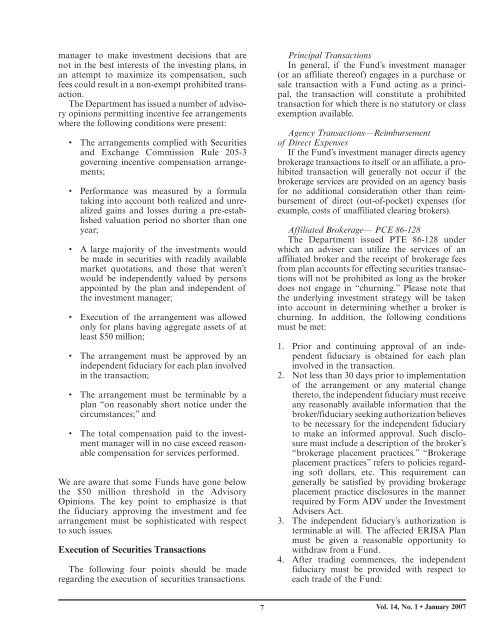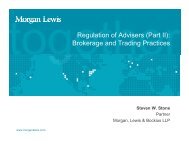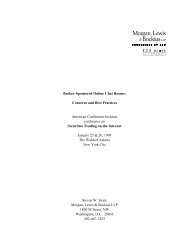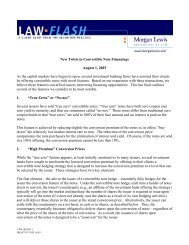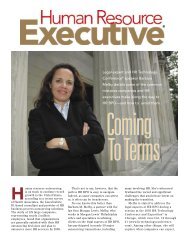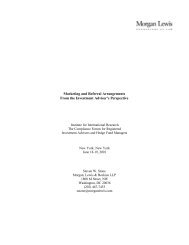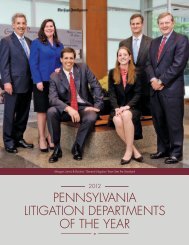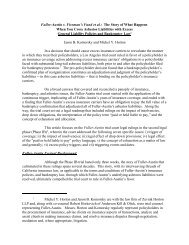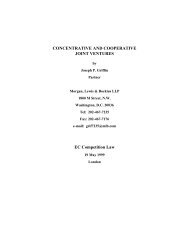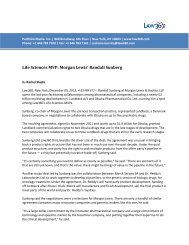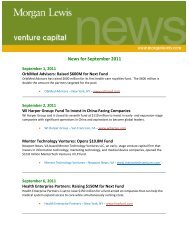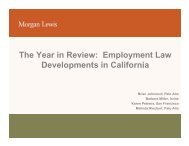What to Do if Your Fund Becomes Subject to ERISA - Morgan, Lewis ...
What to Do if Your Fund Becomes Subject to ERISA - Morgan, Lewis ...
What to Do if Your Fund Becomes Subject to ERISA - Morgan, Lewis ...
You also want an ePaper? Increase the reach of your titles
YUMPU automatically turns print PDFs into web optimized ePapers that Google loves.
manager <strong>to</strong> make investment decisions that are<br />
not in the best interests of the investing plans, in<br />
an attempt <strong>to</strong> maximize its compensation, such<br />
fees could result in a non-exempt prohibited transaction.<br />
The Department has issued a number of advisory<br />
opinions permitting incentive fee arrangements<br />
where the following conditions were present:<br />
• The arrangements complied with Securities<br />
and Exchange Commission Rule 205-3<br />
governing incentive compensation arrangements;<br />
• Performance was measured by a formula<br />
taking in<strong>to</strong> account both realized and unrealized<br />
gains and losses during a pre-established<br />
valuation period no shorter than one<br />
year;<br />
• A large majority of the investments would<br />
be made in securities with readily available<br />
market quotations, and those that weren’t<br />
would be independently valued by persons<br />
appointed by the plan and independent of<br />
the investment manager;<br />
• Execution of the arrangement was allowed<br />
only for plans having aggregate assets of at<br />
least $50 million;<br />
• The arrangement must be approved by an<br />
independent fiduciary for each plan involved<br />
in the transaction;<br />
• The arrangement must be terminable by a<br />
plan “on reasonably short notice under the<br />
circumstances;” and<br />
• The <strong>to</strong>tal compensation paid <strong>to</strong> the investment<br />
manager will in no case exceed reasonable<br />
compensation for services performed.<br />
We are aware that some <strong>Fund</strong>s have gone below<br />
the $50 million threshold in the Advisory<br />
Opinions. The key point <strong>to</strong> emphasize is that<br />
the fiduciary approving the investment and fee<br />
arrangement must be sophisticated with respect<br />
<strong>to</strong> such issues.<br />
Execution of Securities Transactions<br />
The following four points should be made<br />
regarding the execution of securities transactions.<br />
7<br />
Principal Transactions<br />
In general, <strong>if</strong> the <strong>Fund</strong>’s investment manager<br />
(or an affiliate thereof) engages in a purchase or<br />
sale transaction with a <strong>Fund</strong> acting as a principal,<br />
the transaction will constitute a prohibited<br />
transaction for which there is no statu<strong>to</strong>ry or class<br />
exemption available.<br />
Agency Transactions—Reimbursement<br />
of Direct Expenses<br />
If the <strong>Fund</strong>’s investment manager directs agency<br />
brokerage transactions <strong>to</strong> itself or an affiliate, a prohibited<br />
transaction will generally not occur <strong>if</strong> the<br />
brokerage services are provided on an agency basis<br />
for no additional consideration other than reimbursement<br />
of direct (out-of-pocket) expenses (for<br />
example, costs of unaffiliated clearing brokers).<br />
Affiliated Brokerage— PCE 86-128<br />
The Department issued PTE 86-128 under<br />
which an adviser can utilize the services of an<br />
affiliated broker and the receipt of brokerage fees<br />
from plan accounts for effecting securities transactions<br />
will not be prohibited as long as the broker<br />
does not engage in “churning.” Please note that<br />
the underlying investment strategy will be taken<br />
in<strong>to</strong> account in determining whether a broker is<br />
churning. In addition, the following conditions<br />
must be met:<br />
1. Prior and continuing approval of an independent<br />
fiduciary is obtained for each plan<br />
involved in the transaction.<br />
2. Not less than 30 days prior <strong>to</strong> implementation<br />
of the arrangement or any material change<br />
there<strong>to</strong>, the independent fiduciary must receive<br />
any reasonably available information that the<br />
broker/fiduciary seeking authorization believes<br />
<strong>to</strong> be necessary for the independent fiduciary<br />
<strong>to</strong> make an informed approval. Such disclosure<br />
must include a description of the broker’s<br />
“brokerage placement practices.” “Brokerage<br />
placement practices” refers <strong>to</strong> policies regarding<br />
soft dollars, etc. This requirement can<br />
generally be satisfied by providing brokerage<br />
placement practice disclosures in the manner<br />
required by Form ADV under the Investment<br />
Advisers Act.<br />
3. The independent fiduciary’s authorization is<br />
terminable at will. The affected <strong>ERISA</strong> Plan<br />
must be given a reasonable opportunity <strong>to</strong><br />
withdraw from a <strong>Fund</strong>.<br />
4. After trading commences, the independent<br />
fiduciary must be provided with respect <strong>to</strong><br />
each trade of the <strong>Fund</strong>:<br />
Vol. 14, No. 1 • January 2007


